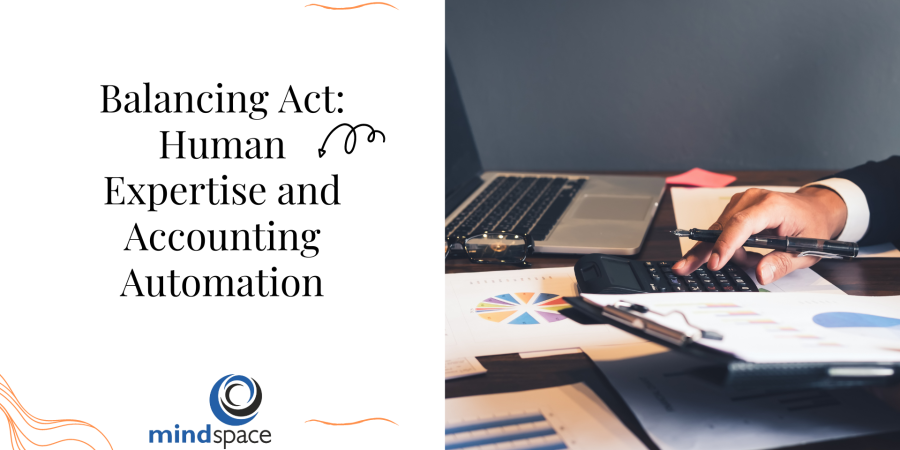Balancing Act: Human Expertise and Accounting Automation
INTRODUCTION-
In the dynamic landscape of modern finance, the synergy between human expertise and accounting automation represents a delicate balancing act that defines the evolution of the profession. As technological advancements continue to reshape the way financial tasks are executed, the imperative is not to replace human capabilities but to strategically integrate them with the efficiency and precision offered by automation. The traditional role of accountants, once synonymous with manual data entry and routine calculations, has undergone a profound transformation. Automation has become a powerful ally, streamlining repetitive tasks and dramatically improving the speed and accuracy of financial processes. Yet, amid this automation revolution, the indispensable value of human judgment, critical thinking, and nuanced decision-making remains irreplaceable. This balancing act is not a struggle for dominance, but a collaborative effort that leverages the strengths of both humans and machines. While automation excels in executing repetitive tasks with unparalleled speed and accuracy, human expertise brings nuanced understanding, contextual interpretation, and ethical considerations to the forefront. The intricate dance between the two ensures that financial decisions are not only precise and efficient but also aligned with broader organizational goals and ethical standards. This delicate balance is not only a response to technological advancements but a strategic imperative for organizations seeking not just efficiency, but resilience and strategic foresight in an ever-evolving financial landscape.
THE HUMAN TOUCH IN FINANCIAL DECISION-MAKING-
In the realm of financial decision-making, the irreplaceable element of the “human touch” remains a cornerstone, offering nuanced perspectives, intuition, and a depth of understanding that automation alone cannot replicate.
Adaptability to Unique Contexts-
- Humans excel at understanding the subtleties and contextual nuances of financial decisions, considering factors beyond numerical data, such as organizational culture, market trends, and geopolitical influences.
- Financial decision-making often requires tailored strategies. Human professionals can adapt and customize approaches to suit the unique needs and goals of an organization.
Complex Problem-Solving-
- Human professionals bring critical thinking skills to the table, enabling them to analyze complex financial problems, identify patterns, and devise creative solutions.
- In dynamic financial environments, the ability to assess risks and uncertainties involves a level of intuition and insight that complements quantitative analysis.
Strategic Planning and Future Vision-
- Human professionals contribute to the development of long-term financial strategies, considering not only immediate gains but also the sustained success and growth of the organization.
- The human touch ensures an adaptive approach to change, allowing for flexible adjustments in financial strategies based on evolving market dynamics.
STRIKING THE RIGHT BALANCE FOR COMPLIANCE-
While automation streamlines processes and enhances accuracy, the human touch remains indispensable in interpreting nuanced regulations, ensuring ethical compliance, and navigating the complexities of an ever-evolving legal landscape.
Adapting to Regulatory Changes:
Automation can monitor regulatory changes in real time, but human professionals play a pivotal role in adapting systems and processes to these changes promptly. Their proactive approach ensures continual compliance amid a dynamic regulatory environment.
Managing Compliance Exceptions-
- Human professionals excel at handling exceptional cases that fall outside the standard compliance parameters. Their ability to exercise judgment ensures that unique circumstances are appropriately addressed in compliance management.
Building a Compliance Culture-
- Beyond automated checks, human professionals foster a culture of compliance within the organization. This involves instilling ethical values, emphasizing the importance of compliance, and promoting a collective commitment to ethical financial practices.
THE FUTURE LANDSCAPE OF ACCOUNTING PROFESSIONALS-
The role of accounting professionals is undergoing a profound transformation in response to technological advancements, changing business landscapes, and evolving client expectations.
Emphasis on Analytical and Strategic Skills-
- With routine tasks automated, the emphasis will shift toward analytical and strategic skills. Accounting professionals will need to interpret complex data, derive insights, and provide strategic financial guidance to organizations.
Strategic Business Advisors-
- Accounting professionals will evolve into strategic business advisors, contributing to decision-making beyond financial matters. Their insights will be sought in areas such as risk management, compliance, and long-term strategic planning.
Enhanced Data Security and Privacy Roles-
- As custodians of sensitive financial data, accounting professionals will play an integral role in ensuring data security and privacy. They will be responsible for implementing robust cybersecurity measures and compliance frameworks.
ETHICAL CONSIDERATIONS IN AUTOMATION-
As automation continues to weave its transformative influence across various industries, including accounting and finance, a critical spotlight is cast on the ethical dimensions that accompany this technological advancement.
Algorithmic Bias and Fairness-
- Automated algorithms can inadvertently perpetuate biases present in historical data. Ethical considerations involve identifying and rectifying biases to ensure fair and unbiased outcomes, especially in decision-making processes that impact individuals or groups.
Job Displacement and Workforce Impact-
- The introduction of automation may lead to workforce displacement. Ethical considerations involve proactive measures to mitigate these impacts, such as retraining programs, upskilling initiatives, and fostering a culture of continuous learning.
Environmental Sustainability-
- Ethical automation extends to considerations of environmental sustainability. Organizations should assess and minimize the environmental impact of automated processes, including their energy consumption and carbon footprint.
CONCLUSION-
In navigating the transformative currents of technological innovation and shifting business paradigms, the future landscape of accounting professionals emerges as a dynamic tableau, blending human expertise with the prowess of emerging technologies. The journey toward this future envisions a collaborative synergy, where automation is not the usurper of traditional roles but the catalyst for a profound evolution. The metamorphosis of accounting professionals foresees a departure from routine tasks as automation assumes the mantle of efficiency in data processing and compliance management. As the boundaries of workspaces dissolve in the wake of remote collaboration tools and cloud-based solutions, accounting professionals find themselves navigating a globalized terrain. Flexibility becomes the norm, and the profession evolves beyond geographical constraints, contributing to a more interconnected and adaptable industry. Embracing diversity, fostering inclusive workplaces, and championing environmental, social, and governance principles characterize the ethical dimensions that will define the future accountant. In this symphony of evolution, the future landscape of accounting professionals beckons—a landscape where the human touch harmonizes with technological prowess, and where accountants transcend their conventional roles to become architects of strategic financial success in an era defined by innovation, connectivity, and ethical responsibility.


